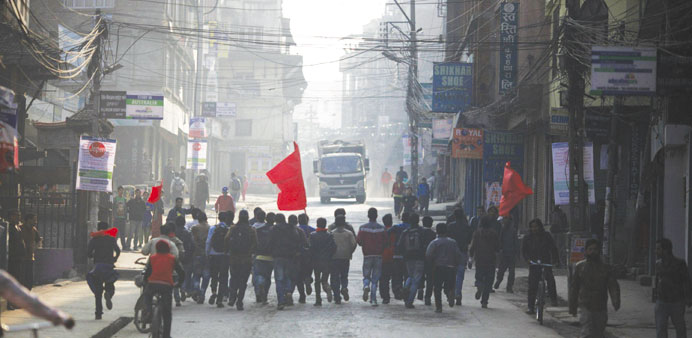Activists affiliated to the Communist Party of Nepal-Maoist carry their party flags as they walk along the street during the nationwide strike called by the Communist Party of Nepal-Maoist in Kathmandu yesterday.
Agencies/Kathmandu
Normal life was yesterday crippled across Nepal due to a general strike called by the fringe Left parties to protest the major political parties’ efforts to form a Chief Justice-led election government.
Major cities, including Kathmandu, were brought to a grinding halt by the strike called by the Federal People’s Republic Front, an alliance of CPN-Maoist, the breakaway faction of ruling UCPN-Maoist and other fringe leftist parties.
They termed the move of the political parties, including the UCPN-Maoist, Nepali Congress, CPN-UML and the Joint Madhesi Front, as unconstitutional and a foreign ploy, indirectly blaming India.
Protesters vandalised office of an Indian joint venture.
“Let’s safeguard national sovereignty, end foreign intervention, stop unconstitutional move to form chief justice led government”, were the major slogans raised by the protesters.
Transportation has come to a standstill and marketplaces, academic institutions and businesses have all remained closed in the capital due to the strike.
Meanwhile, 32 cadres enforcing the strike have been arrested in Hetauda municipality in central Nepal for forcefully closing the market and educational institutions.
Nepal had plunged into a political and constitutional crisis after the constituent assembly was dissolved by Maoist Prime Minister Bhattarai in May last year without drafting the constitution. The crisis further deepened as Bhattarai announced fresh elections in November 2012 but failed to conduct polls.
Paralysed by political gridlock for months, Nepal’s four biggest political parties have turned to supreme court chief justice Khilraj Regmi to take over as prime minister and guide it through long-delayed elections. Regmi’s own court, acting without him, is expected to issue a decision about the plan today.
Lawyers and some political parties have protested the move as an affront to the separation of powers.
A constituent assembly, which acted as a parliament even as it struggled to write a constitution to turn this former war-wracked monarchy into a peaceful republic, finally expired in May after extending deadlines to finish its work four times, in vain. With no permanent constitution, the country has only the expired interim constitution to guide it.
Prime Minister Baburam Bhattarai, of the Unified Communist Party of Nepal (Maoist), has remained in power since then, despite opposition protests that his legal hold on the office had expired as well.
With no one able to agree on who should lead the country into new polls, Bhattarai’s party proposed putting Regmi in charge of an interim government that would hold power until elections in June.
“The opposition parties were not going to allow our party to hold the elections and it was going to prolong the political uncertainty,” said Khimlal Devkota, of the Maoist party. “It is a way out of the political deadlock.”
The three other largest parties said yes.
“We agreed to the proposal because we wanted to create the environment for elections despite knowing that it was against the constitutional process and flawed in every way,” said Dilendra Prasad Badu, a spokesman for the Nepali Congress.
Regmi, 63, has remained free of controversy in his two years as chief justice, until now. The Nepal Bar Association and some of the smaller parties have criticised the arrangement as inappropriately mixing law and politics.
“This is unacceptable in a democracy,” said Dev Gurung of the Communist Party of Nepal (Maoist), an offshoot of the ruling Maoist party. “It is only promoting a party-less, undemocratic system that undermines the roles of the political parties in resolving the deadlock.”
The proposal conflicts with the interim constitution, which bars supreme court justices from holding political positions.
The supreme court is expected to rule today on a case filed against the plan; Regmi is leaving the decision to the rest of the court.
If the court allows the plan to go ahead, Nepal’s largely ceremonial president — who most sides have granted the power to change the interim constitution in the absence of a legislature — would have to issue an ordinance removing ban from the document for Regmi to take over.
Opponents of the plan want Regmi to step down as chief justice if he becomes interim prime minister, but it is unclear whether he will.

